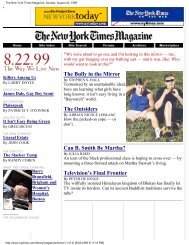The New York Times Magazine, Sunday, August 22 - Unauthorized ...
The New York Times Magazine, Sunday, August 22 - Unauthorized ...
The New York Times Magazine, Sunday, August 22 - Unauthorized ...
You also want an ePaper? Increase the reach of your titles
YUMPU automatically turns print PDFs into web optimized ePapers that Google loves.
<strong>The</strong> Outsiders<br />
but overall they are getting better, definitely."<br />
he quips ricochet around the bedroom like friendly-fire darts. Myles<br />
Forrest, 16, a sophomore with baby fat and sweet eyes, is one of George<br />
Farley's closer friends. George, also 16, is a floater. He has set up camp<br />
with ConVal's freaks for now. George sees weakness everywhere -- in women<br />
who look for milk cartons with the latest expiration date at the store where he<br />
works; in the unemployed drunk who receives an allowance from his working<br />
wife; in white girls who think they are cool because they date guys who are<br />
black. Softness arouses his contempt. He is no more gentle with himself. <strong>The</strong><br />
volleying with Myles, who wears his Y2K T-shirt -- "01-01-00" -- relieves<br />
George of the clearly burdensome obligation of having so much edge.<br />
"<strong>The</strong> end of Myles's life," George starts.<br />
"<strong>The</strong> end of life as we know it," Myles says. <strong>The</strong> phone rings. George lifts the<br />
receiver. "Myles Forrest, loser," he announces, and so the afternoon begins.<br />
Myles and George provide sustenance between insults. Myles fiddles with his<br />
computer -- one of two -- as George peers out over the street. "What's up with<br />
the dress?" George asks, spotting an exchange student from ConVal.<br />
"What? He's Hindu," says Myles.<br />
"I said, What's up with the dress?"<br />
"It's like a cult thing," Myles says, somewhat sharply.<br />
"That's a dress," George says, losing steam.<br />
"It's like a cult thing. It's like a kilt."<br />
"You know I'm messing with you, don't go getting all politically correct with<br />
me." (Later on, Myles will explain the theory of equal-opportunity hatred: "You<br />
ever notice that you can't hate a particular group, but if you generally hate<br />
everybody nobody seems to mind?") <strong>The</strong> sarcasm slows when the Quake<br />
competition begins.<br />
It strikes me as I watch them in front of the famously violent video game that it<br />
is one way for the boys to enjoy closeness without it being threatening. <strong>The</strong><br />
violence of the game, the state-of-siege mentality, the technical expertise<br />
required, supplant the macho expectations and give the boys a rest from the<br />
relentless one-upmanship. Rather than insult each other, they can attack the<br />
game. Soon enough, they are allies in the search for snacks, rushing down the<br />
stairs. <strong>The</strong>y amble past the locked gun case behind the door leading through the<br />
playroom, to the kitchen. George sticks his head in the fridge.<br />
http://www.nytimes.com/library/magazine/home/199908<strong>22</strong>mag-boys-social-coping.html (6 of 13) [8/<strong>22</strong>/1999 9:18:<strong>22</strong> PM]






